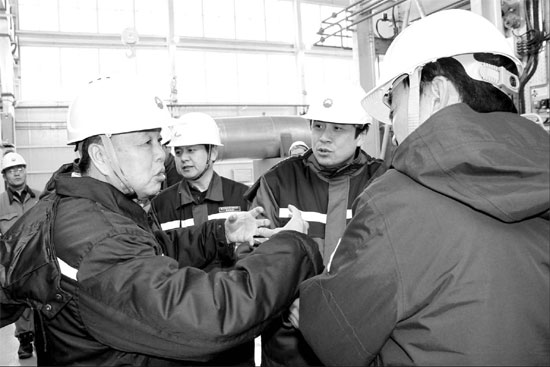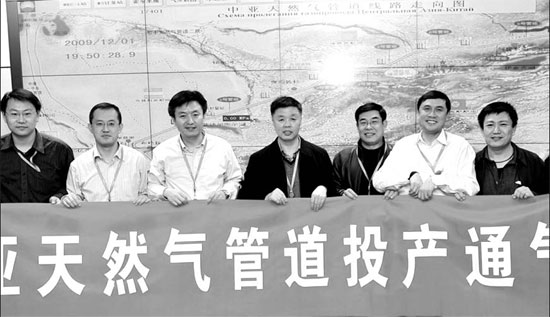Single-minded steward
Updated: 2013-02-21 07:41
By Liu Xiangrui (China Daily)
|
|||||||||||
|
Sun Bo inspected the Central-Asian gas pipeline in February 2012 in Kazakhstan. Photos provided to China Daily |
Sun Bo had been instrumental in cutting some of the major transnational oil pipeline deals for China until he died of a sudden cerebral hemorrhage in December. Liu Xiangrui pays homage to this dedicated oil executive.
While the famous "Iron Man" Wang Jinxi braved the bleak grasslands to explore oil to meet the nation's needs in the 1960s, his successor Sun Bo paved the way for his peers to tap into resources overseas.
While Wang had to cope with an extreme environment, Sun faced complicated challenges in foreign lands.
Sun spent more than half of his three-decade career abroad before he died at 52 of a sudden cerebral hemorrhage in December. He was the vice-president of China National Petroleum Corporation.
After graduating with an oil exploration major in the early 1980s, Sun worked with the Liaohe Oilfield in Liaoning province. Recognized for his hardworking attitude and a series of major achievements, Sun was promoted as the director of the factory at 36.
Sun was involved in international energy cooperation projects when he was called upon for a project in Iraq in 1996.
In the following years, Sun demonstrated his ability as a project manager, and worked across four continents - South America, Middle East, Africa and Central Asia.
Sun's overseas experience broadened his vision, and gave him good coordination skills and the ability to deal with emergencies in international dealings. With the exposure, Sun made considerable contributions to his company's overseas development and China's energy security in recent years.
In 2009, Sun and his team successfully completed the 1,833-km-long Central-Asian gas pipeline in 28 months despite major challenges. Running through four countries, it is China's first energy pipeline to bring in gas from abroad.
Many were amazed because a pipeline of similar scale normally takes six years.
Trans-country pipeline projects, which involve the interests of many parties besides a huge investment and varied construction environment, often take a long time. For example, the oil pipeline from Azerbaijan to Turkey took 10 years from negotiation to completion.
When China and Turkmenistan started their energy cooperation negotiation in July 2007, the two governments agreed that the pipeline construction must be completed before 2009.
Sun was again given the challenging task. "Only a few people can relate their work directly to his nation and people's fates. I feel so lucky that the project has given me such a chance." Those were Sun's popular words, which he often repeated.
Sun promised to complete the mission by "working like a donkey". But his success could also be attributed to his strategic wisdom and negotiation skills.
He managed to bring in the help of experts and successfully persuaded conservationists to agree on changing the single line and straight seam welded pipes in the initial design into double and spiral welded lines, which effectively solved the major obstacle of material shortage.
The project was like a marathon, and Sun had to run at full speed. He hardly took a day off. Except a few hours of sleep a day, he spent the rest of his waking time working, according to his personal assistant Wu Guanjun.
Records show that Sun flew more than 500,000 km within one year from China or between the four Central Asian countries. A lot of them were long haul night flights and he was known for working immediately upon arrival.
"He was not picky about flight times and would just take the quickest one," says Wu. "Jet lag is not in his vocabulary."
While traveling, Sun would take the opportunity to reply to e-mails, think through his negotiations or discuss business with his colleagues.
Before every meeting, Sun would prepare carefully and rehearse the negotiation several times in mind, according to Wu.
"It's worth it to spend your time preparing carefully for the negotiation, which might constitute 90 percent of the profit," Sun used to tell his colleagues.
After years of working abroad, Sun had a deep understanding of the rules for international business. Besides protecting the interests of his own company, Sun won the trust of his business partners with his fair deals, Wu says.
Sun suffered from varicose veins because of his frequent flights. When his condition worsened in 2011, which required him to undergo surgery, Sun decided not go under the knife when his surgeons told him that he couldn't take a plane for six month after the operation.
His devotion was noticed by President Hu Jintao, who described Sun's team as "hero constructors" in his remarks at the opening ceremony of the pipeline.
The pipeline was also honored as a model project of economic cooperation between China and Kazakhstan by top leaders from both nations, and Sun won the highest honor from the Kazakhstan government for his contribution.
The follow-up work kept Sun busy including transnational legal issues.
Sun made a bold innovation by forming a coordination committee, which involved the related gas purchasing, providing and transmitting parties. The committee even functioned as a multi-lateral long-term coordination mechanism.
"My life is full only if I can realize the goal of forming a stable and safe operating system for the pipeline before my retirement," Sun once said.
The pipeline has run smoothly for three years. It supports nearly a quarter of annual gas consumption of China and is playing a significant role in helping China transform its energy structure.
Because of his work, Sun had little time for his family - one of his regrets. But he received unceasing support from his wife and daughter. "Many overseas oil workers face the same situation. We understood his difficulties," said his daughter Sun Fengshi.
In their eyes, Sun loved the family deeply, though he was not good at expressing it. For example, Sun would always call or text his wife and parents as soon as he landed in a new place.
His wife Sun Xiaochun remembers her surprise when Sun called her at the launch ceremony for the Central-Asian pipeline specially to express his gratitude for her support and consideration.
"I was moved because he didn't forget us at such moments. That's his way of expressing his love," she commented.

Known for his strict requirements and decisiveness at work, Sun, often in a plain old yellow jacket, was easygoing and modest in life.
"He often joked with workers. He appeared more like an elderly brother on informal occasions," says Cui Haibo, Sun's colleague in the Central-Asian pipeline project.
In 2007, Sun initialed a "staff caring group" to help them deal with their problems, including family members' illness, children's schooling and personal health.
"If we can't assure overseas workers with basic assistance from their home front, it's impossible for them to focus on their work," Sun explained.
"He paid so much attention to colleagues' health and when he heard anyone coughing, he would remind them to take a rest. But he often neglected his own health and stayed up working as if he was a highly efficient machine," says Wu.
Sun's wife found him in a coma on his bed in November. His death came as a total shock to his family and colleagues as Sun was still working as usual on a follow-up project of the Central-Asian pipeline during the last few days leading to his death.
His computer showed that he stayed up late the night before working on a blueprint of turning the pipeline project into an energy cooperation demonstration area.
Contact the writer at liuxiangrui@chinadaily.com.cn.
|
Sun Bo (center) celebrated with colleagues on the successful completion of the Central-Asian gas pipeline in 2009. |
(China Daily 02/21/2013 page20)
Today's Top News
Police continue manhunt for 2nd bombing suspect
H7N9 flu transmission studied
8% growth predicted for Q2
Nuke reactor gets foreign contract
First couple on Time's list of most influential
'Green' awareness levels drop in Beijing
Palace Museum spruces up
Trading channels 'need to broaden'
Hot Topics
Lunar probe , China growth forecasts, Emission rules get tougher, China seen through 'colored lens', International board,
Editor's Picks

|

|

|

|

|

|







